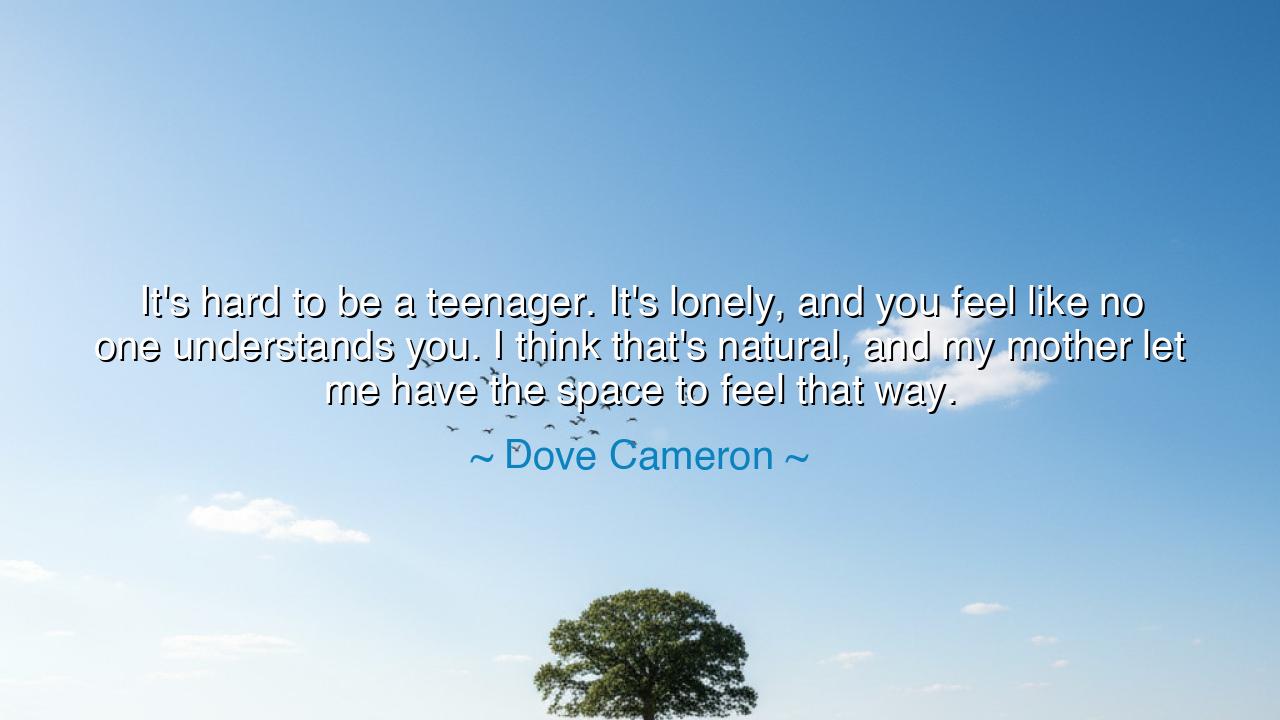
It's hard to be a teenager. It's lonely, and you feel like no one
It's hard to be a teenager. It's lonely, and you feel like no one understands you. I think that's natural, and my mother let me have the space to feel that way.






Hear, O youth and elders alike, the words of Dove Cameron: “It’s hard to be a teenager. It’s lonely, and you feel like no one understands you. I think that’s natural, and my mother let me have the space to feel that way.” These words, though born of a modern tongue, echo truths as old as time itself. For the passage from childhood to adulthood has ever been a tempestuous sea, where the soul struggles between innocence and burden, between longing for guidance and yearning for freedom.
To be a teenager is to stand at a threshold, neither child nor adult, but suspended between the two. It is a season when the heart is aflame with questions, and yet answers are few; when the soul hungers for belonging, and yet finds itself estranged from all. The loneliness of this age is not a flaw, but a rite of passage. For in solitude, the self first meets its own depths. As the ancients endured the wilderness to discover their gods, so too must the young wander through the wilderness of their own emotions, finding the hidden rivers of strength within.
Dove Cameron speaks with gratitude of her mother, who in wisdom did not rush to silence this loneliness, but offered her the space to feel it. This is no small thing. Many guardians, fearing the shadows in their children’s hearts, attempt to shield them from all pain. Yet the wise parent knows that pain, like fire, can purify; and loneliness, like night, can prepare the soul for dawn. To grant space is to grant dignity, to trust that the soul, even when shaken, can rise again.
Consider the tale of Siddhartha, who would become the Buddha. Born into wealth and luxury, his father sought to protect him from suffering, hiding from him the sight of sickness, old age, and death. Yet when Siddhartha at last encountered these truths, the shock drove him to despair and exile. Only by facing the loneliness of the forest and the silence of meditation did he awaken to enlightenment. Had his father allowed him earlier to behold the reality of life, perhaps his journey would have been gentler. Thus, even in the East of long ago, the lesson is clear: shielding the young from sorrow robs them of wisdom.
The understanding that teenagers seek often cannot come from others, for no voice, however tender, can wholly name the storms of a changing soul. Yet to know that one is granted the freedom to feel—to be lonely, to be uncertain, to wrestle in darkness—this is a gift beyond measure. It tells the young: you are not broken for feeling this way; you are simply human, and this too shall shape you.
Therefore, let parents, teachers, and elders take heed: when the young walk through loneliness, do not always rush to drag them out. Instead, stand nearby as a steady presence, offering space without abandonment, guidance without suffocation, love without demand. To do so is to honor their becoming, and to trust that, like iron in the forge, they are being strengthened by fire.
The lesson for you, O listener, is this: embrace the seasons of loneliness in your life, whether you are young or grown. See them not as curses, but as crucibles. Grant yourself the space to feel, and grant others the same. When someone you love is struggling, remember Dove Cameron’s mother, who gave her daughter the dignity of her own sorrow. Do not fear another’s pain; accompany it with patience, and it shall become a stepping-stone to wisdom. In this way, both the young and the old may walk through the wilderness of loneliness and emerge with hearts more radiant, ready for the dawn that surely comes.






AAdministratorAdministrator
Welcome, honored guests. Please leave a comment, we will respond soon